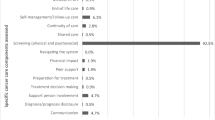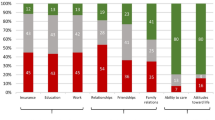Abstract
Cancer is a major disease that affects a significant proportion of the population worldwide. With a decrease in mortality due to advancements in oncology treatment, there is an expanding role for psychosocial oncology. A satellite clinic for medical treatment (only chemotherapy) of cancer is available at the Guelph General Hospital (GGH). Patients accessing the chemotherapy clinic at GGH have minimal access to psychosocial or supportive care and it is not known if the existing services are addressing the psychosocial symptoms of cancer patients. Participants were asked to complete an anonymous survey which included self-report measures of depression, symptom severity, quality of life, and social support while receiving treatment at this facility. There was a great deal of variability in the patients’ emotional symptoms at this satellite clinic, though many patients reported emotional difficulties. Greater social work presence may lead to better identification of patients who would benefit from psychosocial oncology services.



Similar content being viewed by others
References
American Cancer Society (2011) Cancer facts and figures 2011. Retrieved from http://www.cancer.org/acs/groups/content/@epidemiologysurveilance/documents/document/acspc-029771.pdf. Accessed 12 July 2011
Botti M, Endacott R, Watts R, Cairns J, Lewis K, Kenny A (2006) Barriers in providing psychosocial support for patients with cancer. Cancer Nurs 29:309–316
Bowell B (1996) Breast cancer: family under stress. Nurs Times 92(46):52–53
Bruera E, Kuehn N, Miller MJ, Selmser P, Macmillan K (1991) The Edmonton Symptom Assessment System (ESAS): a simple method for the assessment of palliative care patients. J Palliat Care 7(2):6–9
Bultz BD, Carlson LE (2006) Emotional distress: the sixth vital sign—future directions in cancer care. Psycho-Oncology 15(2):93–95
Canadian Association of Psychosocial Oncology (2010) Standards of Psychosocial Health Services for Persons with Cancer and their Families Approved May 28, 2010 © 2010 Canadian Association of Psychosocial Oncology
Canadian Cancer Society (2012) Canadian cancer statistics. Canadian Cancer Society, National Cancer Institute of Canada, Statistics Canada, Public Health Agency of Canada, Toronto
Carlson LE, Waller A, Mitchell AJ (2012) Screening for distress and unmet needs in patients with cancer: review and recommendations. J Clin Oncol 30(11):1160–1177
Cella D, Hahn EA, Dineen K (2002) Meaningful change in cancer-specific quality of life scores: differences between improvement and worsening. Qual Life Res 11(3):207–221
Cella DF, Tulsky DS, Gray G, Sarafian B, Linn E, Bonomi A, Silberman M, Yellen SB, Winicour P, Brannon J (1993) The functional assessment of cancer therapy scale: development and validation of the general measure. J Clin Oncol 11(3):570–579
Cobb S (1976) Social support as a moderator of life stress. Psychosom Med 38:300–314
Cohen M (2013) Depression, anxiety, and somatic symptoms in older cancer patients: a comparison across age groups. Psychooncology. doi:10.1002/pon.3383
Cwikel JG, Behar LC (1999) Organizing social work services with adult cancer patients: Integrating empirical research. Social Work in Health Care 28(3):55–76
Ekedahl M, Wengstrom Y (2007) Nurses in cancer care – stress when encountering existential issues. Eur J Oncol Nurs 11:228–237
Ell K, Xie B, Wells A, Nedjat-Haiem F, Lee P, Vourlekis B (2008) Economic stress among low-income women with cancer: Effects on quality of life. Cancer 112(3):616–625
Enns A, Waller A, Groff SL, Bultz BD, Fung T, Carlson LE (2013) Risk factors for continuous distress over a 12-month period in newly diagnosed cancer outpatients. J Psychosoc Oncol 31(5):489–506
Giese-Davis J, Wilhelm FH, Conrad A, Abercrombie HC, Sephton S, Yutsis M, Neri E, Taylor CB, Kraemer HC, Spiegel D (2006) Depression and stress reactivity in metastatic breast cancer. Psychosom Med 68(5):675–683
Heifetz LJ, Christensen SD, Devere-White RW, Meyers FJ (2011) A model for rural oncology. J Oncol Pract 7(3):168–171
Holland JC (2002) History of psycho-oncology: overcoming attitudinal and conceptual barriers. Psychosom Med 64:206–221
Holland JC, Bultz BD (2007) The NCCN guideline for distress management: A case for making distress the sixth vital sign. Journal of the National Comprehensive Cancer Network 5(1):3–7
Kangas M, Henry JL, Bryant RA (2007) Correlates of acute stress disorder in cancer patients. J Trauma Stress 20(3):325–334
Keir ST, Swartz JJ, Friedman HS (2007) Stress and long-term survivors of brain cancer. Support Care Cancer 15(12):1423–1428
Lauver DR, Connelly-Nelson K, Vang P (2007) Stressors and coping strategies among female cancer survivors after treatments. Cancer Nurse 30(2):101–111
Ma JL (1997) Factors influencing adjustment of patients suffering from nasopharynx carcinoma—implications for oncology social work. Soc Work Health Care 25(4):83–103
Martin MY, Pollack LA, Evans MB, Smith JL, Kratt P, Prayor-Patterson H, Watson CD, Dignan M, Cheney LC, Pisu M, Liwo A, Hullett S (2011) Tailoring cancer education and support programs for low-income, primarily African American cancer survivors. Oncol Nurs Forum 38(1):E55–E59
National Cancer Institute of Canada (2007) Canadian cancer statistics. Available at http://www.ncic.cancer.ca/ncic/internet/standard/0,3621,84658243_85787780__langId-en,00.html. Accessed 20 Jan 2008
Palesh O, Collie K, Batiuchok D, Tilston J, Koopman C, Perlis ML, Butler LD, Carlson R, Spiegel D (2007) A longitudinal study of depression, pain, and stress as predictors of sleep disturbance among women with metastatic breast cancer. Biol Psychol 75(1):37–44
Preyde M, Chevalier P, Hatton-Bauer J, Barksey M (2010) Exploratory survey of patients’ needs and perceptions of psychosocial oncology. J Psychosoc Oncol 28(3):320–333
Preyde M, Synnott E (2009) Psychosocial intervention for adults with cancer: a meta-analysis. J Evid Based Soc Work 6(4):321–347
Radloff LS (1977) The CES-D scale: a self report depression scale for research in the general population. Appl Psychol Meas 1(3):385–401
Roth AJ, Kornblith AB, Batel-Copel L, Peabody E, Scher HI, Holland JC (1998) Rapid screening for psychologic distress in men with prostate carcinoma: a pilot study. Cancer 82(10):1904–1908
Statistics Canada (2011) Low income cut-offs (1992 base) after tax. Available at http://www.statcan.gc.ca/pub/75f0002m/2011002/tbl/tbl01-eng.htm. Accessed 27 Jun 2011
Zimet GD, Dahlem NW, Zimet SG, Farley GK (1988) The multidimensional scale of perceived social support. J Pers Assess 52(1):30–41
Conflict of interest
None declared. This study was not funded.
Author information
Authors and Affiliations
Corresponding author
Rights and permissions
About this article
Cite this article
Preyde, M., Macdonald, J. & Seegmiller, M. Exploratory survey of patients’ needs and perceptions of psychosocial oncology. Support Care Cancer 22, 587–594 (2014). https://doi.org/10.1007/s00520-013-2010-5
Received:
Accepted:
Published:
Issue Date:
DOI: https://doi.org/10.1007/s00520-013-2010-5




